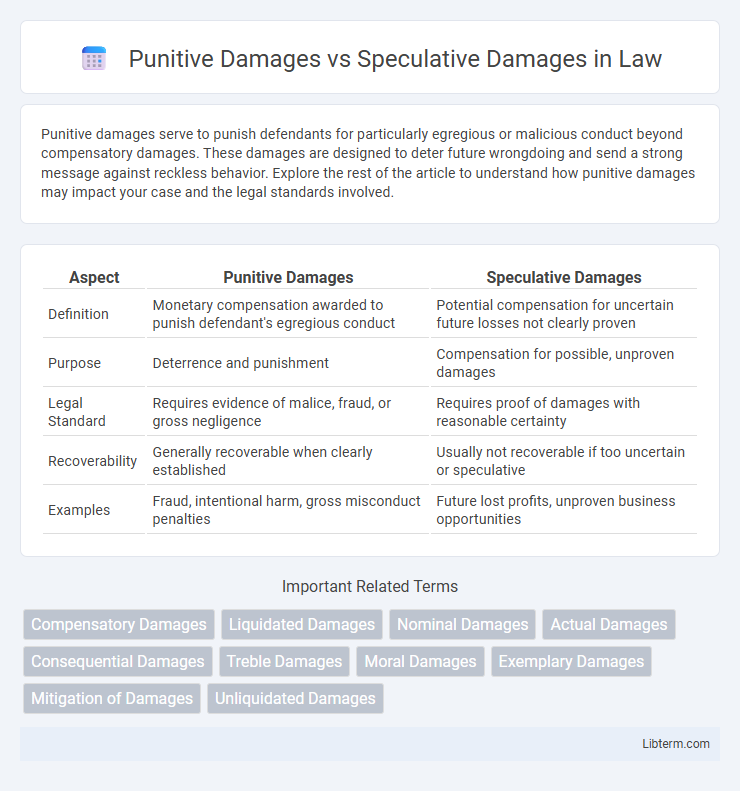Punitive damages serve to punish defendants for particularly egregious or malicious conduct beyond compensatory damages. These damages are designed to deter future wrongdoing and send a strong message against reckless behavior. Explore the rest of the article to understand how punitive damages may impact your case and the legal standards involved.
Table of Comparison
| Aspect | Punitive Damages | Speculative Damages |
|---|---|---|
| Definition | Monetary compensation awarded to punish defendant's egregious conduct | Potential compensation for uncertain future losses not clearly proven |
| Purpose | Deterrence and punishment | Compensation for possible, unproven damages |
| Legal Standard | Requires evidence of malice, fraud, or gross negligence | Requires proof of damages with reasonable certainty |
| Recoverability | Generally recoverable when clearly established | Usually not recoverable if too uncertain or speculative |
| Examples | Fraud, intentional harm, gross misconduct penalties | Future lost profits, unproven business opportunities |
Introduction to Punitive and Speculative Damages
Punitive damages are monetary awards granted to plaintiffs as a means to punish defendants for egregious or malicious misconduct, aiming to deter similar behavior in the future. Speculative damages, in contrast, represent potential or uncertain losses that lack concrete evidence and are often not recoverable due to their conjectural nature. Understanding the distinction between punitive and speculative damages is crucial in legal cases to properly assess compensatory awards and the likelihood of judicial acceptance.
Definition of Punitive Damages
Punitive damages, also known as exemplary damages, are monetary awards granted to a plaintiff to punish the defendant for egregious, malicious, or reckless conduct and to deter similar behavior in the future. Unlike compensatory damages, which aim to reimburse actual losses, punitive damages exceed the plaintiff's actual harm and emphasize punishment and deterrence. Courts typically reserve punitive damages for cases involving fraud, gross negligence, or willful misconduct, making their application less common and more scrutinized than speculative damages.
Definition of Speculative Damages
Speculative damages refer to potential or uncertain losses that have not been proven with reasonable certainty and rely on conjecture or prediction rather than concrete evidence. These damages are not recoverable in most legal cases because courts require damages to be quantifiable and supported by factual data. In contrast, punitive damages are awarded to punish wrongful conduct and deter future misconduct, often exceeding actual damages incurred.
Key Differences Between Punitive and Speculative Damages
Punitive damages are awarded to punish defendants for egregious misconduct and deter future wrongdoing, while speculative damages refer to uncertain, hypothetical losses that lack concrete evidence. Punitive damages require clear proof of malicious intent or gross negligence, whereas speculative damages are often disputed due to their lack of precise valuation. Courts typically reject speculative damages for failing to demonstrate actual economic harm, emphasizing the necessity for reliable and calculable financial losses.
Legal Purpose of Punitive Damages
Punitive damages serve the legal purpose of punishing defendants for egregious misconduct and deterring similar future behavior, beyond merely compensating the plaintiff. Unlike speculative damages, which involve uncertain or hypothetical losses difficult to prove, punitive damages are awarded based on clear evidence of intentional wrongdoing or gross negligence. Courts use punitive damages to reinforce societal norms and promote accountability within the legal system.
Legal Limitations on Speculative Damages
Speculative damages are limited by legal standards requiring claims to be based on reasonable certainty rather than conjecture or guesswork. Courts regularly dismiss or reduce speculative damages when plaintiffs fail to provide concrete evidence quantifying potential losses. In contrast, punitive damages are awarded to punish egregious conduct and are subject to statutory caps and constitutional scrutiny to prevent excessive penalties.
Criteria for Awarding Punitive Damages
Punitive damages are awarded to punish defendants for egregious misconduct and deter future wrongdoing, requiring clear evidence of intentional harm, malice, or gross negligence. Courts evaluate the defendant's conduct severity, the harm caused, and the ratio between punitive damages and actual damages to ensure proportionality. Speculative damages, by contrast, are not awarded because they lack sufficient proof or reasonable certainty regarding the extent or existence of harm.
Challenges in Proving Speculative Damages
Proving speculative damages presents significant challenges due to the inherent uncertainty and lack of concrete evidence linking the alleged harm to quantifiable financial loss. Courts require plaintiffs to provide reliable, well-supported projections based on factual data rather than conjecture or hypothetical scenarios. Unlike punitive damages designed to punish wrongful conduct, speculative damages often fail without clear causation and credible valuation methodologies, making their recovery difficult.
Case Studies: Punitive vs Speculative Damages in Court
In landmark cases such as BMW of North America, Inc. v. Gore, courts have emphasized punitive damages must be proportional to actual harm and clearly intended to punish egregious misconduct, distinguishing them from speculative damages that lack concrete evidence. Speculative damages, often rejected in cases without definitive proof of future losses, contrast with punitive damages which are awarded based on demonstrated malicious or reckless behavior. Case studies highlight that courts rigorously require factual substantiation for speculative damages, while punitive damages serve as a deterrent, reinforcing accountability beyond compensatory judgments.
Conclusion: Navigating Damages in Legal Claims
Effective navigation of punitive damages and speculative damages in legal claims demands a clear understanding of their distinct purposes and evidentiary requirements. Punitive damages aim to punish egregious conduct and deter future wrongdoing, while speculative damages involve uncertain or conjectural losses without concrete proof. Prioritizing thorough documentation and expert testimony enhances the credibility of damage claims, ensuring stronger legal outcomes.
Punitive Damages Infographic

 libterm.com
libterm.com